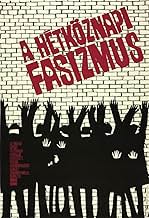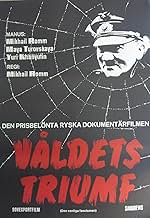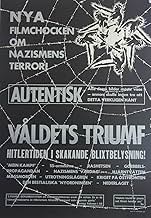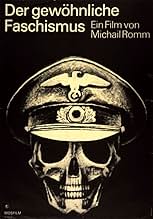PUNTUACIÓN EN IMDb
8,1/10
2,2 mil
TU PUNTUACIÓN
Añade un argumento en tu idiomaA documentary about the rise and fall of fascism and the effects of Nazism on German society.A documentary about the rise and fall of fascism and the effects of Nazism on German society.A documentary about the rise and fall of fascism and the effects of Nazism on German society.
- Premios
- 1 premio en total
Mikhail Romm
- Narrator
- (voz)
Martin Bormann
- Self
- (metraje de archivo)
Willy Brandt
- Self
- (metraje de archivo)
Aristide Briand
- Self
- (metraje de archivo)
Cab Calloway
- Self
- (metraje de archivo)
Georges Clemenceau
- Self
- (metraje de archivo)
Marlene Dietrich
- Self
- (metraje de archivo)
Aleksandr Dovzhenko
- Self
- (metraje de archivo)
Joseph Goebbels
- Self
- (metraje de archivo)
- (as Josef Goebbels)
Hermann Göring
- Self
- (metraje de archivo)
Rudolf Hess
- Self
- (metraje de archivo)
Heinrich Himmler
- Self
- (metraje de archivo)
Adolf Hitler
- Self
- (metraje de archivo)
Kaiser Wilhelm II
- Self
- (metraje de archivo)
King Alfonso XIII
- Self
- (metraje de archivo)
King George V
- Self
- (metraje de archivo)
King Gustaf V
- Self
- (metraje de archivo)
King Haakon VII
- Self
- (metraje de archivo)
Argumento
¿Sabías que...?
- ConexionesEdited into Histoire(s) du cinéma: Une histoire seule (1989)
Reseña destacada
It is hard to draw parallels between this brilliantly narrated compilation of both Allied and Third Reich's archive films and Hollywood's productions such as "Schindler's List" or "Jakob the Liar". While the latter present limited, sanitized and artificial-looking depictions of life under the Nazi rule, Romm's "Ordinary Fascism" pulls out all the stops in its selection of documentary material to draw the viewer not only into absolute horror about fascism and nazism in the 1920s-1940s Europe, but also to a firmest of convictions that nothing of the sort should be allowed to happen again anywhere in the world.
Note the timing: the film was released in 1965, in the Soviet Union's heyday at the height of the great societal and intellectual "thaw" that followed the Stalin's death and the denunciation of Stalin's totalitarianism by Nikita Khruschev. Never explicitly mentioning any of them explicitly, the film targets tyranny and despotism no matter what form they may take; the release of such a film would have been impossible under Stalin.
A good indicator of the power of this film could be the fact that it is available in most video stores in Germany.
Note the timing: the film was released in 1965, in the Soviet Union's heyday at the height of the great societal and intellectual "thaw" that followed the Stalin's death and the denunciation of Stalin's totalitarianism by Nikita Khruschev. Never explicitly mentioning any of them explicitly, the film targets tyranny and despotism no matter what form they may take; the release of such a film would have been impossible under Stalin.
A good indicator of the power of this film could be the fact that it is available in most video stores in Germany.
- mrphik
- 26 mar 2003
- Enlace permanente
Selecciones populares
Inicia sesión para calificar y añadir a tu lista para recibir recomendaciones personalizadas
- How long is Triumph Over Violence?Con tecnología de Alexa
Detalles
- Duración2 horas 18 minutos
- Color
- Mezcla de sonido
- Relación de aspecto
- 1.37 : 1
Contribuir a esta página
Sugerir un cambio o añadir el contenido que falta

Principal laguna de datos
By what name was El fascismo ordinario (1965) officially released in India in English?
Responde



































